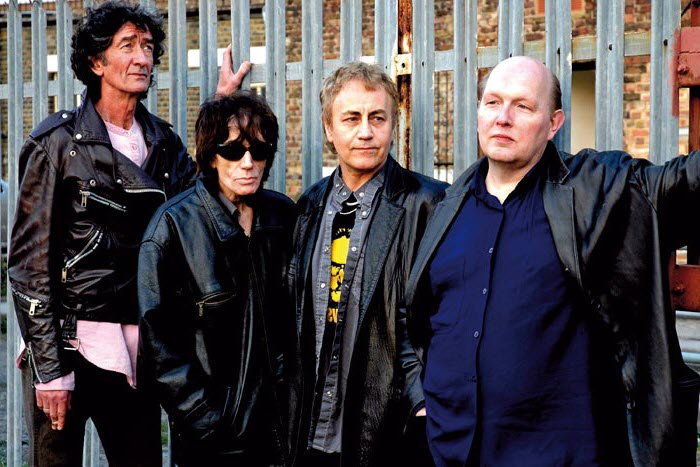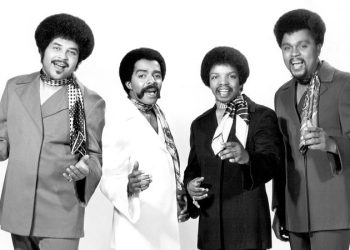The Only Ones, a cult favorite of the late 1970s and early 1980s, carved their place in music history with their unique blend of punk energy, new wave finesse, and melodic rock sensibilities. Fronted by the enigmatic Peter Perrett, the band’s haunting lyrics, intricate guitar work, and raw emotional resonance captivated fans around the world. Though their time in the spotlight was brief, their influence has endured, inspiring countless artists across genres and leaving a lasting imprint on alternative music.
In this article, we take a journey through the band’s timeless catalog to rank the top 10 most popular songs by The Only Ones. From their breakout hit “Another Girl, Another Planet”—widely regarded as one of the greatest rock songs ever written—to hidden gems that showcase their poetic storytelling and musical mastery, each track is a testament to their brilliance.
Whether you’re a lifelong fan or discovering their music for the first time, this list will reignite your love for The Only Ones and remind you why they remain an enduring legend of the music world. So turn up the volume, get ready to reminisce, and dive into the spellbinding world of The Only Ones’ greatest songs!
1. Another Girl, Another Planet (1978)

“Another Girl, Another Planet” isn’t just The Only Ones’ most beloved song — it’s one of the most iconic cult classics to come out of the late ‘70s punk scene. On the surface, it’s a punchy, melodic rock tune, but peel back the layers and you’ll find a swirling cocktail of romantic obsession, emotional escape, and the quiet chaos of addiction. Peter Perrett’s delicate, almost detached vocal delivery is loaded with feeling, giving the song an aching quality that lingers long after the final note. Paired with John Perry’s razor-sharp guitar work — a lead line that practically soars — the track feels urgent yet ethereal. The lyrics can be interpreted in many ways, which only adds to the track’s mystique: is it about falling for someone new, falling into old habits, or just falling apart in the most poetic way? That ambiguity has helped the song endure, as each listener brings their own meaning to it. With its anthemic chorus, emotional resonance, and unforgettable riff, “Another Girl, Another Planet” transcends its punk roots and taps into something universal — that lonely thrill of longing for somewhere (or someone) else.
2. The Whole of the Law (1978)

“The Whole of the Law” is a beautifully fragile moment in The Only Ones’ debut album — a track that trades punk aggression for haunting vulnerability. Clocking in at just over two minutes, it’s short, but incredibly affecting. The song feels more like a quiet confession than a traditional rock tune. Peter Perrett’s vocal delivery is soft, almost whispery, carrying a weight that’s emotional without being melodramatic. The lyrics read like poetry — mysterious, open-ended, and deeply introspective. While its title alludes to the famous occult maxim (“Do what thou wilt shall be the whole of the law”), the song’s focus is clearly on human fragility, personal boundaries, and longing. Backed by delicate instrumentation — subtle guitar lines, a steady drumbeat, and atmospheric touches — the track floats rather than drives. It’s one of those rare songs that makes silence feel just as important as sound. “The Whole of the Law” reveals a different side of The Only Ones — not the sneering outsiders, but vulnerable poets lost in their own thoughts. It’s proof that punk could have a soul, and that sometimes, the quietest songs speak the loudest truths.
3. No Peace for the Wicked (1978)

“No Peace for the Wicked” hits like a gritty, cynical novel packed into three and a half minutes of punchy rock ‘n’ roll. The track is all edge and attitude — a tightly wound blast of defiance delivered with style. Released as part of their 1978 debut, it showcases The Only Ones’ talent for taking punk’s raw energy and infusing it with sharp lyrical storytelling. Peter Perrett plays the role of a disillusioned anti-hero, someone worn out by the world but still fighting against its hypocrisies. The lyrics drip with sardonic wit, portraying a world where redemption is elusive and peace is reserved for the lucky — or the liars. Musically, the song balances punchy riffs and propulsive rhythms, giving it a sense of movement that mirrors the restless discontent of the lyrics. There’s a tension in the track that never fully resolves, which is exactly what makes it so compelling. “No Peace for the Wicked” isn’t just a song — it’s a feeling, a shrug, and a snarl all in one. It remains a fan favorite because it says what many feel: that sometimes, life grinds you down, but at least you can still scream about it with style.
4. Why Don’t You Kill Yourself? (1978)

Bold, bitter, and biting, “Why Don’t You Kill Yourself?” is one of the most provocatively titled tracks in The Only Ones’ catalog — and it’s exactly as sharp and ironic as it sounds. But beneath the surface-level shock lies a surprisingly buoyant, jangly tune that brims with contrast. The upbeat tempo, bright guitar strums, and catchy hooks are deceptively cheerful, while Peter Perrett delivers the lyrics with dry sarcasm and a smirk that cuts deeper with each line. The song walks a tightrope between humor and darkness, using irony as both armor and weapon. It captures the complicated emotional push-pull of toxic relationships — the anger, the hurt, the desire to lash out, all wrapped in a veneer of wit. It’s not a literal song, but rather a cathartic exorcism of frustration, dressed in a melody that dares you to sing along. That juxtaposition — bleak theme, sunny delivery — is part of what makes the track unforgettable. It’s a standout example of The Only Ones’ ability to challenge, provoke, and entertain all at once. Love it or hate it, “Why Don’t You Kill Yourself?” leaves a mark — and that’s exactly the point.
5. Out There in the Night (1979)

“Out There in the Night” feels like a noir film set to music — shadowy, poetic, and full of unanswered questions. Released in 1979, the song finds The Only Ones leaning into atmosphere and mood, crafting a sound that’s both haunting and cinematic. From the opening notes, the track establishes a nighttime energy — that strange mix of beauty and unease that comes when the world quiets down and thoughts grow louder. The guitars shimmer and echo, the bass pulses steadily, and Peter Perrett’s voice floats through it all like a ghost in the fog. Lyrically, the song dances around themes of fear, longing, and existential wondering. Who or what is “out there in the night”? The answer remains elusive, and that’s part of its magic. Rather than spelling everything out, the track invites listeners to step into the darkness and feel their way through. It’s mysterious, a little melancholic, and undeniably beautiful. “Out There in the Night” showcases a more introspective, sonically rich side of the band — proving they could do more than spit fire and sarcasm. They could also create atmosphere, tension, and emotional depth, all while keeping their edge.
6. Lovers of Today (1977)

“Lovers of Today” was The Only Ones’ debut single, and even from this very first track, it was clear they weren’t just another punk band. Released in 1977, it stands apart from the explosive aggression that defined much of that era’s music. Instead, this song leans into emotional vulnerability and aching romanticism, with a raw honesty that feels both urgent and timeless. Peter Perrett delivers the lyrics with his signature mix of weariness and yearning — a voice that always sounds like it’s seen too much, but still dares to hope. The track’s sparse instrumentation gives his words space to breathe, creating a sense of isolation that mirrors the lyrics’ themes of longing and emotional distance. The chorus, simple and repeated like a mantra, sticks with you long after the song ends. It’s not flashy or fast-paced, but it hits hard in a different way — like a whispered truth in a loud room. “Lovers of Today” captures that specific kind of romantic disillusionment that’s at once deeply personal and universally understood. It set the tone for what The Only Ones would become known for: emotional complexity wrapped in poetic grit, delivered with style and sincerity.
7. Miles from Nowhere (1979)

“Miles from Nowhere” is one of The Only Ones’ most expansive and introspective tracks. Released in 1979, it showcases the band’s ability to stretch beyond their punk roots and dive into something more atmospheric and contemplative. The song unfolds slowly, with a sense of space and distance built into every note — echoing the lyrical theme of isolation and emotional disconnection. It feels like a soundtrack to being lost, whether physically, emotionally, or spiritually. Peter Perrett’s voice carries a quiet desperation, almost resigned, yet still holding a thread of longing. The guitars shimmer rather than slash, and the rhythm section holds everything in a gentle sway, creating a kind of drifting sensation that perfectly matches the song’s title. Lyrically, it’s about feeling far removed — from people, from love, from clarity. And yet, there’s beauty in that loneliness, a poetic elegance in simply admitting you’re adrift. “Miles from Nowhere” proves The Only Ones weren’t afraid to slow things down and go deep. It’s a standout not for its energy, but for its honesty — a moment of quiet reflection in a world that rarely allows for pause.
8. Someone Who Cares (1979)

“Someone Who Cares” offers a softer, more contemplative side of The Only Ones — a gentle break from their usual irony and grit. Released in 1979, this track stands out for its understated beauty and emotional clarity. It’s a love song, but not in the typical sense. There’s no sweeping romance or dramatic declarations — instead, it feels honest, tender, and a little bruised. The lyrics suggest a craving for connection, for someone who truly understands and listens, even in the smallest ways. Peter Perrett’s delivery is unusually delicate here, like he’s letting down his guard just a little. The instrumentation mirrors this mood perfectly: simple, melodic, and unobtrusive, letting the emotion shine through without ever overpowering it. It’s not flashy or loud, but it lingers. What makes this song special is its vulnerability — it doesn’t shout to be heard, it simply speaks the truth in a quiet voice. “Someone Who Cares” captures those private, late-night thoughts we rarely say out loud, making it one of the band’s most emotionally resonant tracks. It’s the kind of song you return to when you want something real, something that feels like a friend in the dark.
9. In Betweens (1978)

“In Betweens” crackles with the restless energy of youth, perfectly capturing that strange limbo between innocence and disillusionment. Released in 1978 on their self-titled debut, the song is a brilliant example of how The Only Ones balanced lyrical sharpness with undeniable pop sensibilities. Right from the start, the track bursts into motion with an infectious rhythm and a melody that’s impossible not to move along with. But beneath the upbeat surface lies a more complicated emotional undercurrent. Peter Perrett’s lyrics paint a picture of someone caught in life’s gray areas — not quite here, not quite there, stuck somewhere in between and trying to make sense of it all. There’s a sense of disorientation, of searching for meaning in a world that doesn’t always offer clear answers. And yet, it’s all delivered with a wink and a knowing smirk, which keeps the song from feeling too heavy. The contrast between the lively instrumentation and the introspective lyrics gives it real depth, elevating it from catchy to meaningful. “In Betweens” is a reminder that even the most fun-sounding tracks can carry a heavy truth — and that The Only Ones were always more than met the ear.
10. Curtains for You (1979)

“Curtains for You” closes out Even Serpents Shine with a quiet sense of finality — a beautifully somber track that feels like the emotional curtain call for the album. Released in 1979, it’s a slow-burning, reflective piece that trades noise for nuance, offering one last glimpse into Peter Perrett’s complicated emotional landscape. The title alone suggests an ending — a farewell, perhaps, or a symbolic death of some kind — and the music follows suit with a haunting, almost funereal pace. The guitar lines are gentle but weighted with emotion, and the rhythm section moves with deliberate restraint, letting the mood settle in slowly. Lyrically, it’s ambiguous but heavy with subtext, as Perrett explores themes of disillusionment, loss, and quiet acceptance. His delivery is subdued, yet loaded with feeling — like someone who’s said what they needed to say and is now turning to leave. “Curtains for You” isn’t flashy or grandiose, but its power lies in its subtlety. It’s a song that doesn’t just end an album — it leaves you sitting in silence for a moment afterward, thinking about everything that came before. It’s introspective, poetic, and quietly devastating — the perfect sendoff from a band that never played by the rules.









